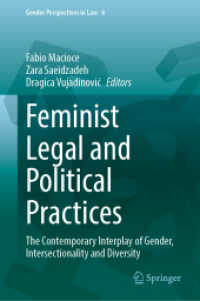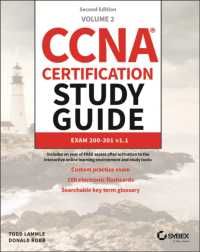- ホーム
- > 洋書
- > 英文書
- > Politics / International Relations
Full Description
The authors of this volume challenge conventional notions about Habsburg and Czechoslovak politics, arguing that they were more democratic than they often appear. At combining political science and history, the authors' guiding principle and means of analysis is the consociational model of democracy. This theory, linked best to Arend Lijphart, asserts that consociationalism guarantees minorities a say in government and helps preserve democracy in societies that experience deep ideological, cultural, or ethnic divisions. It enables the main segments to be isolated organizationally from each other, thus avoiding conflict, and affording the leaders to make compromises for the good of the whole.
Consociationalism has proven its worth as a model for describing contemporary democracies and diagnosing their ills. By exploring the institutions and practices of the Habsburg Monarchy before 1918 and the Czechoslovak First Republic, Howe, Lorman, and Miller prove the value of the consociational theory at analyzing the past. They hold that a multitude of parties, frequent cabinet changes, and reliance on circles of experts do not necessarily signal flawed democracies, when, in fact, they are features of consociationalism. This book is a call to specialists to view current politics not just in terms of majoritarian democracy but rather by the standard of the consociational democracies.
Contents
Tables
Illustrations
List of Abbreviations
Preface
Introduction
Chapter 1: Consociationalism and Consensus Democracy in Theory and Practice
Introduction
The Development of the Consociational Model
The Model
Nine Conditions Favorable to Consociationalism
Consociationalism and Its Critics
Majoritarian and Consensus Democracy
Conclusion
Chapter 2: The Development of Consociationalism in Imperial Austrian
Introduction
Historical Background and Terminology
Favorable and Unfavorable Conditions for Consociational Democracy in Imperial Austria
Imperial Austria as a Semi-Democratic, Proto-Consociational Political System
Regional Compromises as Semi-Democratic Consociationalism
Historians' Criticisms, National Flexibility and the Institutionalization of Ethnicity
Conclusion
Chapter 3: Czechoslovakia as a Consociational Democracy
Introduction
The Diplomatic Career of Lewis Einstein
The Favorable Conditions for Consociational Democracy in Czechoslovakia
The Components of Consociational Democracy in Czechoslovakia
Conclusion
Chapter 4: The Consociational Model and Interwar Slovakia
Introduction
The Favorable Conditions for Consociational Democracy in Slovakia
The Benefits of Participation
The Components of Consociational Democracy in Slovakia
Conclusion
Chapter 5: Conclusion
Evidence of Consociationalism in Central Europe
Contributions to Consociational Theory
Historical Approaches to Consociationalism
Biographies of the Authors
Index








